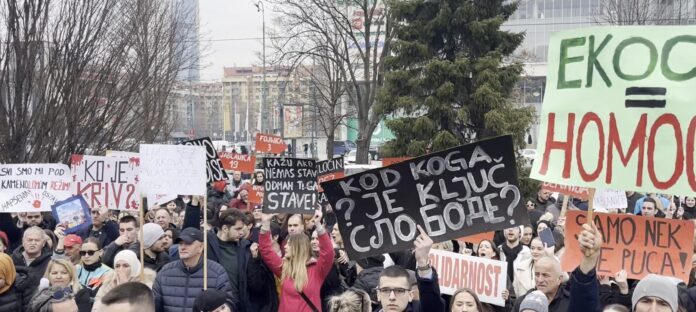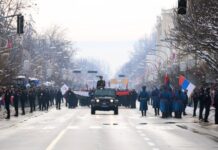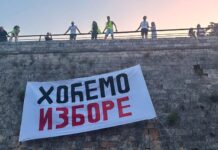These are videos from the protest in Sarajevo.
https://www.slobodnaevropa.org/a/perspektiva-protesti-sarajevo/33316665.html
These are videos from the protest in Zenica. The banners reads: “Support for students in BiH and the region”, “Zenica rises”…
https://www.slobodnaevropa.org/a/perspektiva-zenica-mladi/33333379.html
Ajna believes that the protest was inspired by the actions of students in Serbia.
“I think the students in Serbia are the main driving force behind everything. If they hadn’t raised their voices, no one else in the region would have reacted to certain issues. They gave us the motivation, because now we’re seeing more and more boycotts here in Bosnia as well.”
https://www.slobodnaevropa.org/a/perspektiva-zenica-protesti/33341584.html
Zenica did rise, but almost immediately, it lay back down. In Sarajevo, the protest over the tragedy in Donja Jablanica ended before it even began. The cause, say Fatima and Nadine, is indifference.
“I feel like young people have given up on themselves. We don’t even fight for an extra exam date, let alone something more important.”
https://www.slobodnaevropa.org/a/perspektiva-zenica-mladi/33333379.html
“Whether it’s small things or big issues, people just don’t care. Violence happens, beit physical or psychological…people are too passive. Young people are too passive.”
https://www.slobodnaevropa.org/a/perspektiva-zenica-mladi/33333379.html
How do students in Serbia, who have been protesting for eight months, continue to find motivation, while young people in Bosnia and Herzegovina do not? What’s the difference? Professor Edin Pobrić explains:
“In Serbia, the movement is happening in the name of people. Here, unfortunately, we’ve replaced people with a nation.”
https://www.slobodnaevropa.org/a/perspektiva-bih-tuzla-mladi/33324899.html
Journalist Vanja Šunjić, speaking in Perspektiva, says that in a society where the primary value is not the individual but the collective – specifically the nation – it becomes easy to manipulate people, and even normalize indifference to the suffering of others.
“If you have a herd of equal, non-thinking individuals, it’s much easier to manipulate them than people who have their own opinions and build their identity on something that isn’t, by default, religious or national, and doesn’t have to be straight, either!”
https://www.slobodnaevropa.org/a/perspektiva-bih-tuzla-mladi/33324899.html
Does indifference have deeper roots? Professor Edin Pobrić offers further insight when speaking to Perspektiva:
“First, it’s a transgenerational problem. The idea that change is possible often dies within the family home. Young people grow up with fathers and mothers who tried and failed to improve this society and this country after the war. Second – and this must be said loud and clear, with the best intentions – personal identity today is tied to public perception. We live in an age of social media, where your status defines your place in society.”
https://www.slobodnaevropa.org/a/perspektiva-bih-tuzla-mladi/33324899.html
“It’s hypocritical,” said one young man on Perspektiva, “to demand change but refuse to take part in making it happen.” Maybe, as Fatima says, young people in Bosnia and Herzegovina have given up on themselves. But students in Serbia are proving the opposite.













